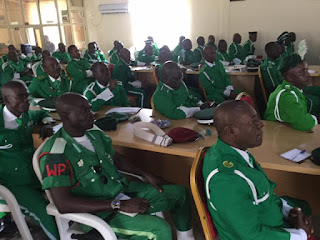5 WAYS PRESIDENT BUHARI HAS POSITIVELY TRANSFORMED INFRASTRUCTURE FINANCING IN NIGERIA
The biggest challenge to infrastructure development in Nigeria over the decades has been sustainable financing. Major projects require significant funding, which the annual Federal budgets are incapable of mobilising or deploying.
But this has been the model over the years: seeking to tackle everything through the budget; releasing money in bits and pieces year after year. Little wonder the years passed and no progress worth noting was made.
That has since changed, since President Buhari assumed office in 2015. Here are the ways in which the administration has been unlocking capital, both within and outside the public sector, and guaranteeing a steadier stream of infrastructure financing.
1) Presidential Infrastructure Development Fund (PIDF) (2018):
Established by President Buhari on February 25, 2018 with seed funding of $650 million, as a special investment vehicle for fast-tracking the completion of critical road infrastructure projects across the country. The goal of the Fund is to eliminate the risks of project funding and cost variation which routinely plague road projects in Nigeria.
Link: https://nsia.com.ng/PIDF-Projects
2) Executive Order 7 (2019):
Issued by President Buhari on January 25, 2019, Executive Order #7 of 2019, on the Road Infrastructure Development and Refurbishment Investment Tax Credit Scheme, allows companies that are willing and able to spend their own funds on constructing critical roads, to recover their construction costs by paying reduced taxes, over a period of time, and in a transparent manner.
Oversight of the scheme is by the Ministers of Finance and of Works and Housing. So far, more than a trillion Naira has been mobilised through Executive Order 7, for road projects across all six geopolitical zones of the country.
Link: https://www.nipc.gov.ng/ViewerJS/?#../wp-content/uploads/2019/03/PRESIDENTIAL-EXECUTIVE-ORDER-007-OF-2019.pdf
3) Highway Development and Management Initiative (HDMI) (2020):
Unveiled by the Federal Ministry of Works and Housing in partnership with ICRC in 2020, to attract expertise and sustainable investment in the development and maintenance of federal road infrastructure and highway furniture in Nigeria, as well as maximise the use and management of assets along the federal Right of Way.
For the first phase of the HDMI, 12 federal highways have been selected, collectively representing approximately 2,000km (5.6 percent) of Nigeria’s 35,000km network of federal highways.
HDMI will improve safety and security on federal highways, reduce travel time and cost, reduce vehicle operating costs, create massive commercial and investment opportunities on federal highways (advertising signage, rest and recreation areas, shopping, etc), and generate employment opportunities.
In this first phase of implementation, HDMI is expected to mobilise 1.34 trillion Naira in private sector investment.
Link: https://hdmi.worksandhousing.gov.ng/faq
4) InfraCorp (2021):
The Infrastructure Corporation of Nigeria (InfraCorp) was established by President Buhari in February 2021, with initial seed Capital of N1 Trillion, provided by the Central Bank of Nigeria (CBN), the Nigerian Sovereign Investment Authority (NSIA) and the Africa Finance Corporation (AFC).
InfraCorp’s goal is to “to catalyse and accelerate investment into Nigeria’s infrastructure sector by originating, structuring, executing and managing end-to-end bankable projects in that space.”
In addition to the 1 trillion Naira equity seed capital, InfraCorp is expected to mobilise up to an additional 14 trillion Naira of debt capital.
In April 2022, InfraCorp signed term sheets with four independent infrastructure asset managers (Sanlam InfraWorks; Africa Infrastructure Investment Managers (AIIM); AAA Consortium; and Chapel Hill Denham), heralding the formal commencement of fundraising by the Corporation.
Link: https://www.cbn.gov.ng/out/2021/ithjcedyeuiwq/infracorpftadvert.pdf
5) Sukuk (2017, 2018, 2020, 2021):
The Buhari Administration is the first in the history of Nigeria to issue Sovereign Sukuk for road infrastructure projects. Since the first issuance in September 2017, more than 600 billion Naira has been raised so far, and deployed to more than 40 major roads and highways across the country.
Sovereign Sukuk 1, 2017: 100 billion Naira
Sovereign Sukuk 2, 2018: 100 billion Naira
Sovereign Sukuk 3, 2020: 162.5 billion Naira
Sovereign Sukuk 4, 2021: 250 billion Naira
Link: https://www.dmo.gov.ng/fgn-bonds/sovereign-sukuk



Comments
Post a Comment